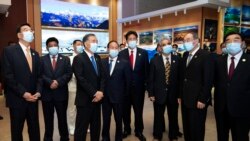A top Chinese official has called for “all-round efforts” to ensure Tibetans speak and write in Chinese.
The official, Wang Yang, spoke at a recent ceremony in front of the Potala Palace in Lhasa. The building is the ancient home of the Dalai Lamas, leaders of traditional Tibetan Buddhism.
In his speech, Wang said all Tibetans must share in, what he called, “cultural symbols and images of the Chinese nation.”
The official is a member of the small and powerful Politburo Standing Committee.
The ceremony was held to mark the 70th anniversary of the Chinese invasion of what is now the Tibet Autonomous Region. China has ruled the large Himalayan area since 1951, when the People’s Liberation Army seized the territory in what it calls a “peaceful liberation.”
"Tibet can only develop and prosper under the party's leadership and socialism," Wang said.
China has also pointed to its efforts to improve the economy in the area.
Critics say China’s moves to expand Chinese cultural influences threaten Tibet’s traditional Buddhist culture. Chinese leaders condemn the current, widely-accepted Dalai Lama as a separatist. He lives in exile in northern India.
Wang said, “separatist and sabotage activities committed by the Dalai (Lama) group and hostile external forces have been crushed.”
He added that since 1951, Tibet had taken “a path from darkness to brightness, from backwardness to progress, from poverty to prosperity and from autocracy to democracy.”
The U.S.-based International Campaign for Tibet, however, sees Tibet’s past progress very differently. “Judging by developments in Tibet over the past 70 years, the Tibetan people have no cause for jubilation,” the group said in a statement. It added: “Chinese policies have turned Tibet itself into an open-air prison with restrictions on all aspects of Tibetan life."
China recognizes the current Panchen Lama -- who was put in place by the Chinese Communist Party -- as the highest religious official in Tibet. As a mark of the party's rule over Tibetan Buddhism, Wang presented the Panchen Lama with a special memorial during the ceremony.
I’m Bryan Lynn.
The Associated Press and Reuters reported on this story. Bryan Lynn adapted the reports for VOA Learning English. Caty Weaver was the editor.
We want to hear from you. Write to us in the Comments section, and visit our Facebook page.
__________________________________________________
Words in This Story
liberation – n. to help someone or something be free
symbol – n. a sign or object that is used to represent something
prosper – v. to be successful, usually by earning a lot of money
commit – v. to do something that is considered wrong or illegal
autocracy – n. government by a single person or small group that has unlimited power or authority
jubilation – n. a feeling of great happiness
aspect – n. one part of a situation, problem, subject, etc.






